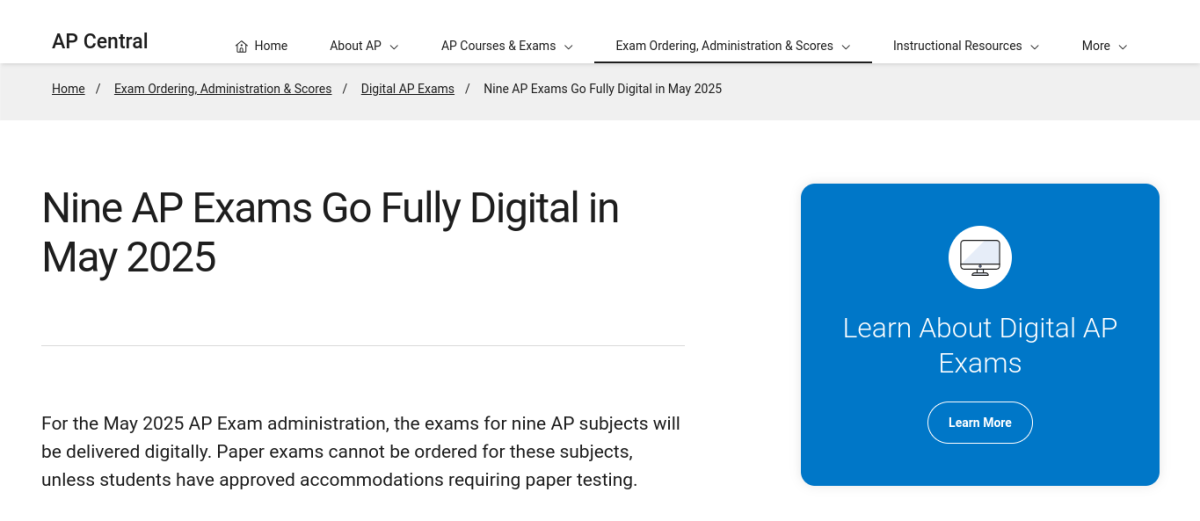The college admissions process is like one huge whirlwind—everything occurs very quickly and there is not much time to argue or think things through. Most students are advised by their parents, teachers and counselors about what classes to take, what standardized tests to focus on, and what Advanced Placement (AP) courses to enroll in, without much time to fully analyze the justness and validity of the system into which we are lunged.
The College Board is the company that administers tests, such as SAT, SAT Subject Tests and AP tests, and 5,700 schools, colleges, universities and educational organizations participate in the College Board’s programs. While the company claims it is not-for-profit and earns tax benefits from the IRS, it does not look or act like a nonprofit.
According to a cnn.com article published Dec. 29, 2009, College Board CEO and president Gaston Caperton makes about $900,000 in salary, benefits and perks, three of the College Board’s executives make more $300,000 in salary and benefits, and the company has total yearly revenues of around $600 million.
While the executives and officers of the College Board are earning a fortune, the SAT, which most students take not out of choice but because they are required to, is emptying out most students’, or parents’, bank accounts by the end of the students’ high school careers. Each full exam is $47, each Subject Test costs $21 for registration plus $10 per test, and sending scores to universities costs $10 per school after the first four free schools.
When the Score Choice score reporting policy, a policy that allows students to choose SAT scores by test date and SAT Subject Test scores by individual test before sending them to colleges, was enacted by the College Board in March 2009, the policy—according to the College Board—was “designed to reduce student stress and improve the test-day experience.” However, if a student takes the SAT multiple times, he will need to pay $47 for the test each time—and that is assuming that no additional late fees are paid—and the cost of reporting scores to colleges and scholarship programs additionally goes up because there are more tests to choose from.
The College Board has a monopoly over the entire college application process for high school students—the company owns the most widely used college admissions exams, and many students are required to take at least one of the College Board’s standardized tests for admission to competitive universities. Even in cases when the ACT, another test run by an outside not-for-profit organization of the same name, is an alternative to the SAT, some schools still required that the SAT Subject Tests be additionally taken by the student.
In schools without an IB program, like CHS, the way that most students’ academic aptitude is measured is through the number of AP courses the student takes, as well as the score the students receives on each of the college-level exams. With its control over APs, the fate of a student’s high school and college career is basically in the hands of the College Board. The company not only writes the test, but it also dictates what each teacher must teach by designing the entire AP course curriculum without much flexibility and also gives each student a final score on his/her performance on the final exam in May—a score that can make or break a student’s chances of earning college credit.
Even with Maryland Governor Martin O’Malley’s new “AP Access and Success” plan, which will waive the $86 fee required to take an AP exam for all Maryland students and cut the $13 PSAT fee for high school juniors, the system is still in dire need of reform.
The new plan is essentially taking money out of taxpayers’ wallets to pay a non-government institution to become even wealthier and continue its reign over the entire U.S. education system. The state education funds could be used to serve much more important needs, like paying teachers, supporting county-wide programs, and funding for classes.
In addition, in order for students to be considered for financial aid during the college application process, more than 600 colleges, universities, graduate and professional schools, and scholarship programs require students to submit a CSS/Financial Aid PROFILE, which, just like everything else, is run by the College Board. Ironically enough, when a student is applying to be considered for financial aid, he must pay the College Board a $25 application fee, as well as an additional $16 for each college or scholarship program to which the student wants his information to be sent.
The College Board, which claims to be primarily concerned with students’ educations and scholastic achievements, is actually more concerned with nothing but mere profit and economic gain. High schools, colleges and universities cannot continue buying into a system that is clearly flawed and monopolizing the entire education process for students who have no other choice. It is crucial that academic institutions stop endorsing the College Board and that other alternative companies introduce additional, fairer options for the college admissions process. The College Board cannot continue a façade as a not-for-profit company when it is essentially treating students’ educations and academic endeavors as a business to cash in on.
Categories:
College Board has monopoly on education
October 29, 2010
Story continues below advertisement
0
More to Discover













